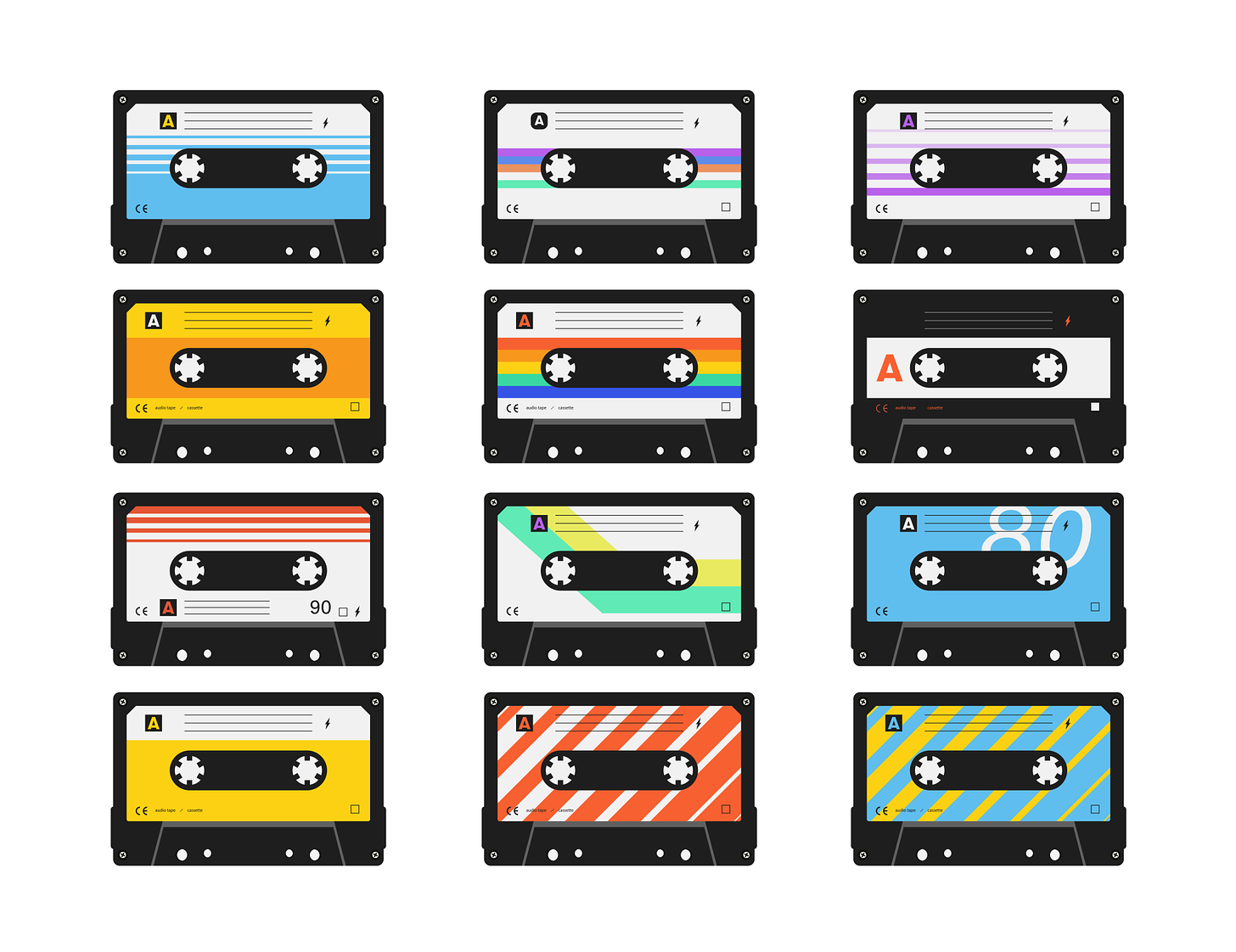Long Time Gone #1
A new occasional Oldster Magazine column from former music executive Cliff Chenfeld, this one on: The unprecedented lasting influence of music from the '60s and '70s. Plus: 10 new songs for old ears.
Last month I attended One Big Holiday, the destination music festival that the band My Morning Jacket headlines and hosts, where the Jacket and a handful of other compatible artists (War on Drugs, Courtney Barnett, etc.) play for 3,500 people at an all-inclusive resort south of Cancun.
The median age of the attendees was probably around 40, with plenty of people in their 20s and 30s. The event was very laid back — most of the day was spent hanging around the pool and beaches, and the live music didn’t kick in until the evening. It was a fabulous weekend and way more chill than attending the kind of traditional music festival that features multiple stages and dozens of performers.
Plenty of music was played during the day, from DJs performing, to songs piped into restaurants, pools and beaches. And while an occasional song from the 21st century could be heard, the soundtrack was primarily hits from the ‘60s, ‘70s and early ‘80s.
Given the crowd’s relative youth, the age of the piped-in music really caught my attention. Everyone knew the tunes and many sang along with gusto to baby boomer classics from the likes of Bill Withers, Toto, Fleetwood Mac, Wings, Dobbie Brothers, Stevie Wonder and more. No one seemed to think it was unusual that this relatively young audience was grooving to music, most of which was recorded well before they were born.
While an occasional song from the 21st century could be heard, the soundtrack was primarily hits from the ‘60s, ‘70s and early ‘80s. Given the crowd’s relative youth, the age of the piped-in music really caught my attention.
To understand how remarkable that is, let’s imagine that in 1975, a band like Little Feat, sort of the My Morning Jacket of its day, hosted a similar festival. Between sets by, say, Bonnie Raitt and Leon Russell, suppose the programmers played almost exclusively songs that were recorded 40 to 60 years earlier. That would mean songs from the 1920s and 1930s. The year 1924 was 50 years before 1974, just like 1974 was 50 years ago.
I suspect that those blissed-out ‘70s folks would not have reacted as well if the festival producers played the music of Benny Goodman and Glenn Miller between sets from the likes of The Band and Linda Ronstadt .
But today, youngsters vibing to AARP-friendly music has become the norm. Music that was recorded in the middle of the last century (The Beatles anyone?) remains omnipresent in our culture and in our collective consciousness, nearly 60 years later. Many of us who were already born and sentient when this music came out don’t realize how unusual it is for the music of our youth to remain so culturally relevant. It’s unprecedented.
How lucky are we today that the music of our youth has not been discarded by future generations, but in fact has been enthusiastically embraced to the point of worship? It appears we may be the first generation whose music retains its cultural currency well past its expected expiration date.
Every generation thinks that the music that they listened to when they were young is better than what came before or after. The music we listened to during our impressionistic, emotionally heightened youth usually makes an indelible impression upon us that we carry for the rest of our lives.
Unfortunately, as prior generations got older, their music became quickly outdated and relegated to nostalgia and irrelevance by what came after. But not for my generation. Why do 20somethings and 30somethings like Abba, Queen and the Grateful Dead, while most of my cohort stayed as far as possible from Mitch Miller and Harry James when we were their age?

Well, many of us think our music really was just that special, and simply way better than what came next. I’m not going to go there, but the unique changes that occurred in culture, media and technology in the post-World War II era led to a creative musical revolution that rendered music more central and essential to people’s experiences than in previous decades. And that music really hasn’t been replaced. The pop music of the 60s and 70s swept most of the music that came before it out of the mainstream culture. But the musical styles that have emerged since then — from hip-hop to dance to electronic – did not replace the foundational music of the 60s and 70s, but simply broadened the scope of popular music. That’s why you can still hear much of the influence of long ago in the music of Taylor Swift, Dua Lipa, Ed Sheeran, Hozier, Beyonce, and many others.
In general, music in the ‘60s and ‘70s was more central to people’s lives than it is now. There was no social media, online games, or iPhones that could distract you from losing yourself to an album. And the big songs were more ubiquitous than they are today. In the pre-streaming era, fans were listening to the same songs on the radio, and unless you were a complete music junkie, you weren’t accessing odd 45s and alternative radio stations. Today, you can enjoy millions of songs and never once encounter a hit by today’s biggest artists. Everyone knows all about Taylor Swift, but not everyone knows most or even some of her top songs.
Today, youngsters vibing to AARP-friendly music has become the norm. Music that was recorded in the middle of the last century (The Beatles anyone?) remains omnipresent in our culture and in our collective consciousness, nearly 60 years later.
That ubiquity also created stars with legendary, iconic status that remains very appealing to younger fans. They seem to long for the era when these exalted artists walked the earth. I’ll never forget attending the Bonnaroo Music Festival in 2012 when the Beach Boys performed, or at least the act that was representing themselves as the Beach Boys that year. It was a pretty cringy performance — backup singers handled lots of the vocals, and the whole thing made me sad. Two 20somethings were listening next to me, and they couldn’t have been happier. I asked them what they thought, and they said that it was one of the best shows they had ever seen; the Beach Boys were part of the soundtrack of their lives, and they felt fortunate to be in the same space as them.
I don’t think a 25-year-old at my imaginary Little Feat Festival in 1975 would have had the same reaction to an appearance by Patti Page
Some musical style may emerge in the coming years and sweep Boomers’ and Gen Xers’ beloved music from the cultural landscape. But in the meantime, we can enjoy the very extended life of our precious, formative music.
🚨Twice a month, we feature an Oldster Top 10 by Modern Sounds radio host Cliff Chenfeld. Here’s the latest:
“2024 has been a fabulous year for music so far and Modern Sounds radio host Cliff Chenfeld is here to find the songs that you will love. Cliff features new music from mostly new artists who he thinks will have great appeal to Oldster subscribers. You can find all of these songs on the Modern Sounds playlist on Spotify. Enjoy…”
Vampire Weekend – Classical – One of today’s most reliable artists comes back with an eclectic album following their Dead-inspired 2019 release.
St. Vincent – Big Time Nothing – The adventurous, never predictable Annie Clark is back with a powerful new album.
Tyla – Water – Sultry new r+b hit that is climbing the pop charts.
Waxahatchee with MJ Lenderman – Right back to It – Channeling some Lucinda Williams and Tom Petty but feeling very contemporary.
Justice – Generator – Electronic music for folks who don’t always like electronic music.
Iron and Wine/Fiona Apple – All In Good Time – An instant classic from two excellent, enduring artists.
Circles Around The Sun, Mikeala Davis – After Sunrise –Trippy, beautiful collaboration from analog instrumentalists Circles Around the Sun and acclaimed harpsichordist Mikeala Davis.
Ibrahim Malouf – Fly With me – Sweet track from the Lebanese Trumpeter.
Mdou Moctar – Oh France – Nigerian guitar hero integrates his playing with African rhythms and changes that are not usually heard from western rock guitarists.
Decemberists/James Mercer – Burial Ground –Strolling through a graveyard seems so fun in this tuneful song from the indie legends.








Not 100% analogous, but this column reminded me of a line from Billy Crystal's standup in the late 80s: "You know you're old when your kid comes to you and says, 'Hey, dad, did you know Paul McCartney was in a band before Wings?'"
I enjoyed this. Liked the points about emotionally heightened youth when music meant so much to us, and the relative lack of distraction around music back then. I remember coming home with a new album and playing on repeat, studying the lyrics and liner notes. Loved that.